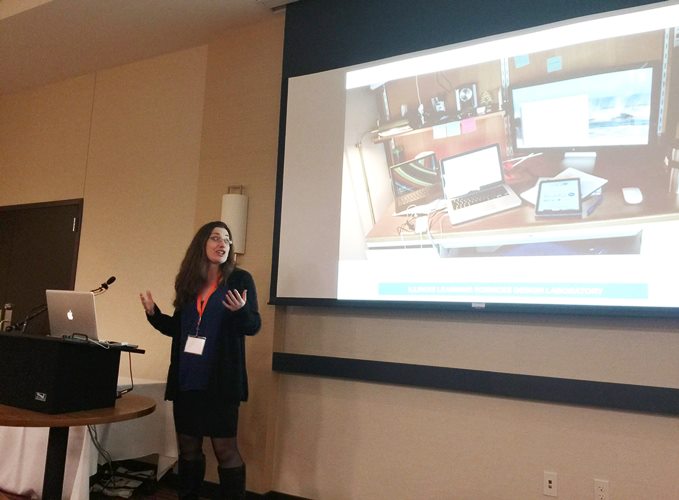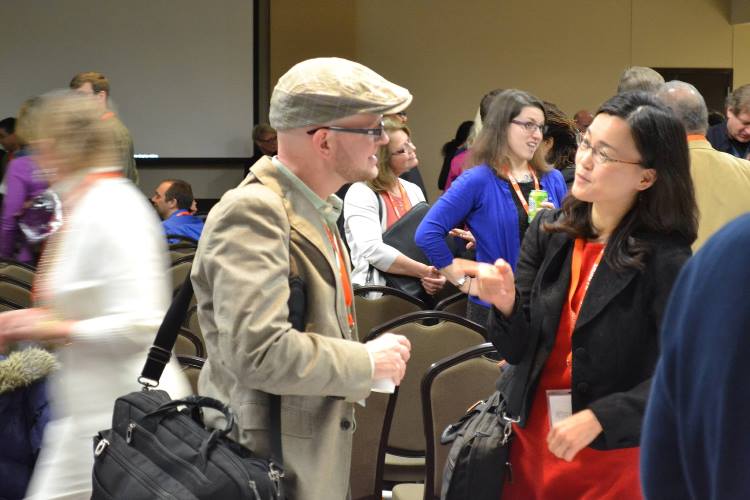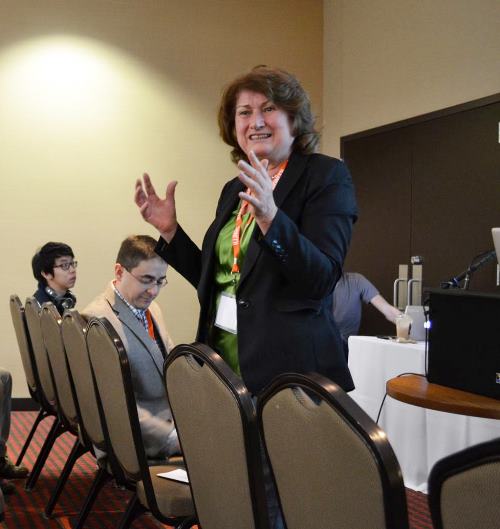Campus symposium charts direction for transformative 21st-century learning
by Sal Nudo / Mar 11, 2015

Groundbreaking event organized by College of Education, on behalf of Illinois campus, leads way toward inventing and building tools to transform learning
Dean Mary Kalantzis, Associate Dean Fouad Abd-El-Khalick, and Vice Chancellor for Research Peter Schiffer had ambitious plans to span disciplines and professions when they discussed a symposium to lay the groundwork for an Illinois Learning Sciences and Design Laboratory (ILSDL). Yet the trio envisioned the occasion being a “cozy event” and booked a small room in the I Hotel in Champaign.
Fortunately for them—and perhaps for the campus and world, when all is said and done—the symposium attracted a large number of energized faculty members and graduate students from across campus.
“It resonated with their passion for improving learning across contexts and the lifespan,” said Abd-El-Khalick.
In all, 122 faculty and graduate students from 37 academic units, centers, and institutes representing eight colleges, as well as the Beckman Institute and the National Center for Supercomputing Applications (NCSA), presented at the Feb. 27 “Toward an Illinois Learning Sciences Design Laboratory: A Lightning Symposium.” The event ended up taking place in a larger room at the Hyatt in Champaign and drew approximately 175 presenters and participants.
 The aim of the daylong symposium was to learn about and discuss how to proceed with three undertakings to develop ILSDL: (1) advance the scientific understanding of learning; (2) design tools, environments, and platforms to improve, deepen, and accelerate learning and learning processes and outcomes; and (3) design tools to analyze big data to transform uniform learning platforms into adaptive and personalized learning environments.
The aim of the daylong symposium was to learn about and discuss how to proceed with three undertakings to develop ILSDL: (1) advance the scientific understanding of learning; (2) design tools, environments, and platforms to improve, deepen, and accelerate learning and learning processes and outcomes; and (3) design tools to analyze big data to transform uniform learning platforms into adaptive and personalized learning environments.
Schiffer acknowledged in his opening remarks to attendees that these are “big, big challenges,” but that they have important consequences for the world.
“You have to start somewhere; this is where we’re starting from,” he said. “I think this is going to be a fantastic initiative for campus. This is really building on a strong, strong legacy. It’s the next step forward.”
ILSDL is an initiative spawned by the campus’s 2013 Visioning Future Excellence at Illinois Outcomes Report. The symposium drew faculty members and research groups on campus, people who could bring the initiative a broad range of expertise in research, design, development, and tool creation.
 “You are the power in everything we’re doing today,” Dean Kalantzis told the group at the beginning. “Whatever we talk about at the top means nothing unless it animates faculty.”
“You are the power in everything we’re doing today,” Dean Kalantzis told the group at the beginning. “Whatever we talk about at the top means nothing unless it animates faculty.”
Faculty members and graduate students indeed sounded animated as they participated in five-minute lightning talks during the first session. Topics included robot learning, computational metacognition, and big data. Education Professor Emma Mercier’s presentation, “Classrooms as Device Ecologies: Designing Technology to Support Collaborative Learning in Classrooms,” related her multi-year study of a technology-enhanced classroom to support collaborative learning.
“Technology development can no longer be considered solely in terms of how it serves the individual learner,” Mercier’s abstract says. “The tools become integrated into the classroom device ecology, and the role of the teacher becomes more integrated into the learners’ experiences with technology.”
The event also included interactive poster displays, demonstrations, roundtables, and more lightning talks at the end. To move ILSDL forward, Abd-El-Khalick said the colleges of Education and Engineering at Illinois, as well as the Beckman Institute and NCSA, have committed money toward a seed funding program.
Edward Seidel, director of the National Center for Supercomputing Applications (NCSA), said his unit is fully engaged in the initiative and that “we should aim really high for what we can do here.” He cited the unique diversity of colleges on campus as a beneficial aspect of the project. Seidel also said that all the computing and data capacity at NCSA is useless unless it is brought to the heart of the University and the research and education processes.
“It is clear to us that we have incredible capacity across campus,” Abd-El-Khalick said of the breadth and depth of expertise on learning that was represented by participating faculty members, colleges, and units. “We have great ingredients on this campus to engage in building the next generation of teaching and learning tools and environments, across the lifespan, across contexts.”
Dean Andreas Cangellaris of the College of Engineering envisions ILSDL bringing together the campus and scholars from all over the world to advance 21st-century education. With developed technologies and an understanding of the human mind like never before, he said, past divisions have been broken down, allowing people in all fields to think ultra-creatively—together.
“Urbana-Champaign is important. When it comes to technology, new ideas, talent that goes out there and makes amazing things happen, we are important,” he said. “This campus has come together today to make something different happen.”
Education professors involved in symposium’s lightning talks
William Cope and Mary Kalantzis
“Big Data Comes to School: Reconceptualizing Evidence and Research in the Era of Technology-mediated Learning”
William Cope
“Learning Critical Thinking at Scale: Automated Assessment of Complex Assignments for MOOCs”
Emma Mercier
“Classrooms as Device Ecologies: Designing Technology to Support Collaborative Learning in Classrooms”
“Sketch Recognition Technologies for Creation, Learning, and Assessment”
Jennifer Cromley
“Teaching Students to Coordinate Scientific Text and Diagrams”
Elizabeth Stine-Morrow
“Enrichment Effects on Cognitive Skills”
“The iTrain Project: Effects of Home-based Verbal Working Memory Training on Language Comprehension in Older Adults”
Peter Kuchinke
“Workplace Learning and Self in the Context of Late Modernity”
Hua-Hua Chang
“CD-CAT – From Adaptive Testing to Adaptive Learning”
Jose Mestre, Carolyn Anderson, Hua-Hua Chang, Hyeon-Ah Kang, Jason Morphew, and Katherine Ryan
“Using Computer-Adaptive Testing to Improve STEM Learning, Test Performance and Retention”
Jose Mestre and Jennifer Greene
“Illinois WIDER – Scaling Cultures of Collaboration: Evidence-based Reform in Gateway STEM Courses”
Nick Burbules
“Learning Design for Dual-Mode Courses”
Eunjung Grace Oh
“Exploring Learners’ Argumentation and Cognitive Engagement in Online Discussions”
Michelle Perry
“Exploring Student-centered Approaches to Improve Participation of Underserved Learners in MOOCs”
H. Chad Lane
“Virtual Sprouts: Game-based, Intelligent Learning Technologies for Science Education and Behavior Change”
H. Chad Lane and Maya Israel
“An Educational Gaming Platform for Training Spatial Skills”
“Game-based Virtual Internship Environments”
David Brown, Robb Lindgren, and H. Chad Lane
“Improving Contexts for Learning from Science Simulations with Gestural Inputs and Adaptive Framing”
Jessica Li, Allison Bell, Debbie Hrubec, Xue Yan, and Seohyun Lee
“Promoting Meaningful Participation in Online Learning Environments: Using Learner Analytics to Create Effective Feedback”
Dan Morrow and Renato Azevedo
“Collaborative Patient Portals: Leveraging Conversational Agents”
Robb Lindgren and Jose Mestre
“STEM Learning through Technology-enabled Physicality”